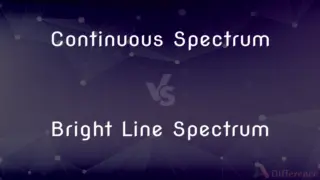May I vs. Can I — What's the Difference?
By Tayyaba Rehman — Published on January 13, 2024
"May I" is traditionally used to ask for permission in a polite or formal context. "Can I" is commonly used to inquire about someone's ability or possibility to do something, but in informal settings, it is often used interchangeably with "May I."

Difference Between May I and Can I
Table of Contents
ADVERTISEMENT
Key Differences
May I is the conventional choice for politely asking for permission. It's often used in formal contexts or when the speaker wants to show respect or deference. Can I, while also used to seek permission, primarily questions the ability or possibility of doing something and is generally less formal.
In terms of usage, May I implies a request for authorization and is more about seeking approval from someone else. For example, "May I leave the room?" suggests asking for permission to leave. On the other hand, Can I often implies the speaker is questioning their own capability or the feasibility of an action, like "Can I lift this heavy box?"
In educational and professional environments, where formality and politeness are emphasized, May I is the preferred form. In contrast, Can I is frequently used in casual conversations and everyday informal communications.
There's a subtle difference in tone and politeness between the two phrases. May I carries a higher level of politeness and is often considered more courteous. Meanwhile, Can I is more direct and can be perceived as less formal.
It's important to note that in modern conversational English, particularly in informal settings, many people use Can I and May I interchangeably when asking for permission, although purists might still prefer the traditional distinction.
ADVERTISEMENT
Comparison Chart
Primary Use
Asking for permission
Inquiring about ability or possibility
Formality
More formal and polite
Less formal
Context
Professional, educational, formal settings
Casual, everyday conversations
Implication
Seeking approval or authorization
Questioning capability or feasibility
Tone
Courteous and deferential
Direct and straightforward
Compare with Definitions
May I
Appropriate in formal settings.
May I speak to the manager?
Can I
Inquires about capability or possibility.
Can I solve this puzzle?
May I
Used to politely ask for permission.
May I use your phone?
Can I
Less formal and more direct.
Can I start the presentation now?
May I
Implies a request for authorization.
May I enter the office?
Can I
Suggests a casual tone.
Can I come over to your place?
May I
Indicates deference or respect.
May I suggest an alternative?
Can I
Used in everyday conversations.
Can I borrow your pen?
May I
Conveys a higher level of politeness.
May I join your table?
Can I
Often used informally to ask for permission.
Can I grab a coffee?
Common Curiosities
Should I always use "May I" in professional environments?
It's advisable as it shows respect and politeness.
Can "Can I" be used in formal situations?
It's less common, but in some informal formal contexts, it may be used.
How do children typically learn to use these phrases?
They often start with "Can I" and are taught to use "May I" in more formal settings.
Is "May I" more polite than "Can I"?
Yes, "May I" is generally considered more polite.
In which English exams is the distinction important?
In exams testing on formal English usage, like some ESL tests.
Why is "Can I" more frequently used in everyday language?
It's more direct and informal, aligning with casual conversation styles.
Is one more correct than the other?
Both are correct but are used in different contexts for appropriateness.
Are there situations where "Can I" is preferred over "May I"?
In casual, everyday scenarios among friends or family, "Can I" is often preferred.
Can "May I" be used to ask about capabilities?
It's less common and might sound overly formal or incorrect in that context.
Does the use of "May I" vary by region?
Yes, its usage can vary in different English-speaking regions.
Is "Can I" incorrect when asking for permission?
Not necessarily incorrect, but it's less formal than "May I."
Do "May I" and "Can I" mean the same thing?
They are often used interchangeably, but they have different primary meanings.
How do young children typically phrase permission requests?
They often start with "Can I" and are later taught the more polite "May I."
Is "May I" becoming less common?
In casual conversation, yes, but it remains important in formal contexts.
Is it important to teach children the difference?
Yes, understanding the difference helps in learning polite and context-appropriate language use.
Share Your Discovery

Previous Comparison
Continuous Spectrum vs. Bright Line Spectrum
Next Comparison
& vs. &&Author Spotlight
Written by
Tayyaba RehmanTayyaba Rehman is a distinguished writer, currently serving as a primary contributor to askdifference.com. As a researcher in semantics and etymology, Tayyaba's passion for the complexity of languages and their distinctions has found a perfect home on the platform. Tayyaba delves into the intricacies of language, distinguishing between commonly confused words and phrases, thereby providing clarity for readers worldwide.












































